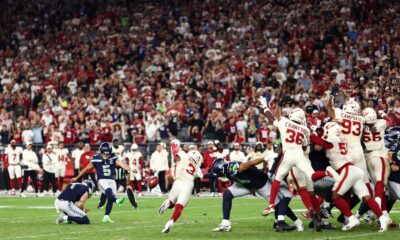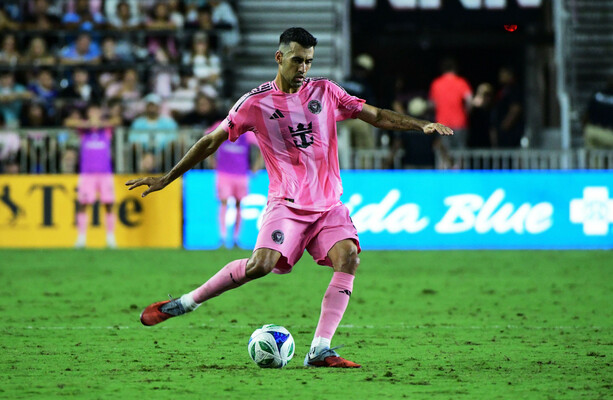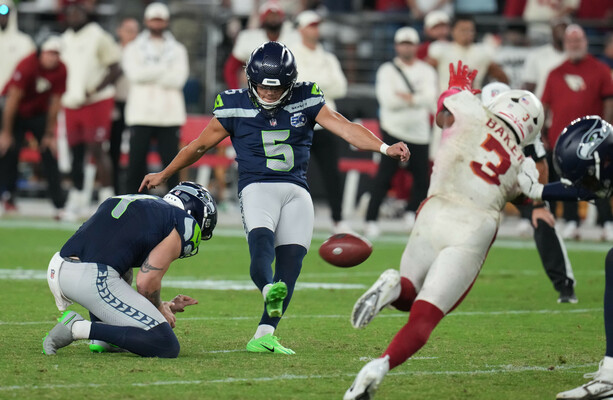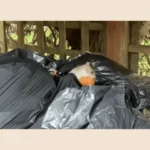ANOTHER DAY, ANOTHER visit to Leinster House for representatives of a sport in Ireland.
Twenty four hours after the FAI’s appearance in front of the Joint Oireachtas Committee on Arts, Media, Communications, Culture and Sport, there were guests welcomed in far more cordial terms at the behest of Senator Garret Ahearn.
The Fine Gael rep for Tipperary invited Willie Mullins, Aidan O’Brien, Rachael Blackmore, Jane Mangan, and Horse Racing Ireland CEO Suzanne Eade to give a presentation to Oireachtas members on the economic and social impact of the thoroughbred breeding and racing industry to Ireland.
It is not hard at all to draw drastic contrasts with events a day previously.
Even before Wednesday, there were any number of worthy column topics this week.
The Beat was at Dalymount Park on Friday night to watch Stephen McMullan concede one of the worst own goals in memory.
How does a goalkeeper cope after something like that?
On Monday, Mason Melia celebrated turning 18 with two goals for St Patrick’s Athletic on what could be an extremely successful farewell tour.
The Republic of Ireland U21 international is just one goal shy of Padraig Amond’s tally of 13 at the top of the scoring charts.
With five Premier Division games to go, what a story it would be for Melia to bid farewell to the League of Ireland as top scorer before arriving at Tottenham Hotspur in January.
Possibly even with a second FAI Cup winners’ medal in his pocket, too.
The Beat will be travelling to Prague with Shamrock Rovers next Wednesday as they begin their Uefa Conference League league phase campaign.
Stephen Bradley could have regained the Premier Division title – their fifth in six seasons – by the time they board, should they beat Bohemians in their Dublin derby at Tallaght Stadium and Derry City fail to beat Drogheda United in Louth tonight.
The story of that inevitability will soon be written.
Dundalk are also on the brink of returning to the Premier Division under Ciaran Kilduff, although they stuttered last week. Despite a six-point lead with four games to go, a look at the fixture list with a mischievous eye throws up the tantalising prospect of the Lilywhites somehow going to the final day of the season when they face a trip to second-placed Cobh Ramblers.
Dundalk fans are probably braced for such a scenario given the last five years – and it won’t be lost on some how the first title delivered by Stephen Kenny in 2014 was also won in a final night duel with Cork City.
And yet, despite all of this, it’s an interview that took place on the footpath outside Leinster House on Wednesday that was always the catalyst for this column.
It was there, after just shy of three hours as chair of the Joint Oireachtas Committee for Sport, that Alan Kelly took questions from reporters following that appearance from the FAI that he labelled as “disrespectful to the Irish people.”
While the FAI delegation carried out a debrief just across the road in Buswells Hotel, and buses whizzed along between shouts from protestors holding placards decrying ‘Ireland’s Shame’ (they weren’t there for the FAI, it must be said), Deputy Kelly confirmed that he would be writing to Minister for Sport Patrick O’Donovan and that funding being sought for Irish football in the upcoming Budget could be withheld as a result of the FAI’s “unprecedented” and “farcical” committee appearance.
We say funding for Irish football and not the FAI, because that is exactly how CEO David Courell framed it too, clearly aware that creating as much distance as possible is a necessity.
And that is of course the case giving the ask is being made from the League of Ireland department in Abbotstown on behalf of academies throughout the country.
The main hope now is that decision makers in Leinster House, those who have already built up a steady rapport with League of Ireland officials, are able to differentiate between the executive of the FAI and not let the fallout from this week’s Oireachtas committee colour their thinking completely.
“Financial supports cannot be withdrawn because the government is annoyed with how the FAI were unable to answer questions at the committee,” Sinn Féin spokesperson on Sport, Joanna Byrne TD, said.
Deputy Byrne was on that Joint Oireachtas Committee and is also chairwoman of Drogheda United.
At various stages this year overarching issues at the FAI have prevented League of Ireland officials from properly advancing their case for the required funding over the next 11 years, building slowly over the next 24 months to a top end amount of €8 million per year that will then taper off for the final few years.
On 30 April, for example, 90 TDs and Senators from all parties welcomed Courell, LOI academy director Will Clarke, and FAI grassroots director Ger McDermott for presentations – similar to the ones from horse racing yesterday.
Courell spoke first for up to 20 minutes, providing updates on governance as well as Euro 2028 plans, and then Clarke gave a 15-minute update on their timeframe for a funding document for academies.
Then it was the turn of McDermott to make his presentation, and the questions that followed over the following 30 minutes were solely related to the aligned calendar and its impact on grassroots football.
The Beat spoke to Pearse Doherty, Sinn Féin’s deputy leader in the Dáil, and party spokesperson on Finance, after that meeting as he was one of those in attendance.
Like many others, he was impressed by the League of Ireland’s academy plan and stated vision, but the issues around the aligned calendar are what dominated his thoughts because they were being fed back to him locally.
There are those who believe that when the League of Ireland received funding from Government of €1m to help towards the audit of acadmies it was a litmus test of their own ability to produce a dilligent and professional piece of work on time and within budget following a neccessary procurement process.
They delivered on all fronts, and the results were stark, laying bare how League of Ireland academies lag behind countries ranked 51-100 by Fifa.
It was the result of more than three months of non-stop graft to ensure the audit was produced on time, coming off the back of numerous seven-day working weeks, late nights and lost weekends to try and provide an honest assessment of where Irish football finds itself.
It’s in a black hole, and only financial assistance will provide any hint of light for those people dedicating their lives to Irish football, the same people who have already shown they are worthy of our trust to finally drag player development here into the 21st century.









































